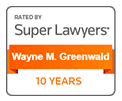New York Bankruptcy Attorney & Criminal Defense Lawyer For White Collar Crimes

Clients Treated Better Than Family

Personalized Consultation

Relatable Representation

Excellent Client Reviews
Wayne Greenwald, P.C., offers creative solutions to debt and business problems. Debtors, creditors, trustees, investors, landlords and other interested parties in debtor-creditor matters have relied on us to provide effective solutions to complex legal and financial challenges.
We are an innovative debtor-creditor practice, offering a unique knowledge of the interplay between bankruptcy and commercial, business, domestic, criminal problems, and other interrelated legal issues. Our clientele includes:
- Small to midsize businesses and their owners
- Individual debtors
- Members of the Fortune 500 and Forbes 500
- The ministry of defense of a foreign sovereign
- Secured and unsecured creditors
- Banks and insurance companies
- Trustees and creditors’ committees
- Indentured trustees
- Landlords
- Parties involved in commercial litigation
- Individuals facing financial and criminal problems
- Foreign and domestic investors
- Hedge funds
- Judgment debtors
Our Practice Areas
Wayne Greenwald, P.C., offers a full-service debtor-creditor practice for clients in New York and throughout the nation.

Entrepreneur Rescue
Entrepreneurs are optimists by nature. Recognizing there’s a problem is a big step in “entrepreneur rescue.” Next...
Read More
Chapter 11 Bankruptcy
Chapter 11 bankruptcy is a reorganization proceeding used by businesses, including corporations, other entities and sole...
Read More
Individual Chapter 11
While Chapter 11 bankruptcy might largely be used by businesses, in certain circumstances individual debtors can...
Read More
Commercial Litigation
Wayne Greenwald, P.C., represents plaintiffs and defendants in commercial litigation. We represent clients in all phases...
Read More
Bankruptcy & Criminality
People and businesses facing financial problems sometimes exacerbate matters by doing things having criminal law...
Read More
Chapter 7 & 13 Bankruptcy
Of the 6 types of bankruptcy listed in the Bankruptcy Code, the two that are arguably most used by individuals are Chapter 7...
Read More
Subchapter V Bankruptcy
Subchapter V a part (or “subchapter”) of the Small Business Reorganization Act of 2019, which took effect in February 2020...
Read More
Involuntary Bankruptcy
Most bankruptcies are filed and entered into willingly by debtors, or people holding debt that has become unmanageable...
Read MoreNew York Debtor-Creditor Law Attorney
NY Business Bankruptcy Lawyer | Commercial Disputes | Creditors’ Rights

We represent debtors and creditors in Chapter 7, 11 and 13 bankruptcy proceedings and provide a wide range of bankruptcy and non-bankruptcy alternatives. We also represent parties in commercial disputes, bankruptcy litigation and asset preservation that is critical to clients who are accused of financial misconduct, including white collar crimes. Frequently, we assist entrepreneurs needing strategies to save their business or help them individually if their business cannot be saved.
Creditors rely on us for sophisticated and novel representation in bankruptcy cases, voidable transfer actions, collection of judgments and accounts, commercial disputes and other creditors’ rights matters. Wayne M. Greenwald is a highly regarded debtor-creditor attorney who represents clients throughout the nation in matters critical to their personal or corporate success. His experience handling debtor-creditor matters exceeds 30 years. Wayne Greenwald’s commitment to clients and his strong record of results earned his inclusion among New York Super Lawyers on numerous occasions.
Contact a New York Debtor-Creditor Attorney
For experienced and creative legal representation, contact Wayne Greenwald, P.C. We serve clients throughout New York and across the nation. Call us at (347) 212-5955 to contact our law office in New York City. You may also contact us online.
What People Say
Mentor For Life
“Wayne is a patient and detailed attorney who knows exactly what he's doing in the world of Chapter 7 and 11. Dealing with these initially frightening options can be emotional and frustrating. Wayne was able to give me a clear and detailed path to moving forward and at every step of the way was honest...”
Andrew
A Great Lawyer And Even Better Person
“I had the pleasure of dealing with Wayne on a complex bankruptcy and securities matter. Within the first 5 minutes of speaking with him, he immediately put my mind at ease, and the patience with which he explained everything in layman's terms was refreshing.”
Neil
Professional And Highly Trustworthy Attorney
“Wayne is not only a professional attorney but an amazing human being with high empathy who goes above and beyond to help his clients. I will recommend Wayne over and over to any of my fellow friends if they end up in an unfortunate situation like I was.”
Ilya
New York Bankruptcy Law Blog

Chapter 11 Bankruptcy In New York: A Strategic Path To Business Recovery
When Debt Threatens Your Business, Chapter 11 Offers A Lifeline Running a business is hard enough without the…
READ MORE![Has the Second Circuit Extended the Automatic Stay. . . Again[1][2]]( https://www.bankruptcystrategies.com/wp-content/uploads/2024/02/Has-the-Second-Circuit-Extended-the-Automatic-Stay.jpg)
Has the Second Circuit Extended the Automatic Stay. . . Again[1][2]
The Bankruptcy Code’s “Automatic Stay”[3] is its “fundamental” protection.”[4] In summary, it enjoins efforts to prosecute claims against…
READ MORE![A LEG UP FOR EQUITY? Part II – Freeze Claims [1]]( https://www.bankruptcystrategies.com/wp-content/uploads/2024/02/A-LEG-UP-FOR-EQUITY-Part-II-–-Freeze-Claims.jpg)
A LEG UP FOR EQUITY? Part II – Freeze Claims [1]
Equity security holders[2] or investors [3] (“Equity Holders”) in debtor entities are usually subordinated to creditors’ claims in…
READ MOREHow To Find Us?
Wayne Greenwald, P.C., We serve clients throughout the nation, including New York, New Jersey, Massachusetts, Connecticut, Pennsylvania, New York City, Boston, Philadelphia and Miami.
Request A Consultation Now
Fill the form below to get in touch. We'll get back to you right away!
Legal Questions
- My attorney settled the case by forging my signature on release. What do I do?
Talk to your new attorney about correcting what happened. If the attorney was not authorized to sign the stipulation, it could probably be undone.
- Can a NYC supreme court judge order a party to sign papers that would increase that party's debt and liability during a divorce?
The short answer is yes. A divorce court can require it. Is it proper in your case? You need to discuss all of those circumstances with your divorce lawyer. Don't have one? Wisdom suggests getting one.
- How do I transfer assets and liabilities between affiliated companies?
You are transferring assets. Unless there's an exchange of value (payment from the acquirer, ) depending on the circumstances, the transfer could later be challenged as a fraudulent conveyance, as to the transferor’s creditors. It's best to discuss and the transaction with a lawyer and document it with an agreement, to avoid that problem.
- What should i do if my bank blocks my online account access until 91-page terms and agreements document is signed?
It seems that the bank is looking to change the terms of your relationship. You need to know the terms of your existing relationship. It may permit their conduct, it may not. Consider reading the new agreement to see if there's anything offensive. Yes, it's 91 pages.
- Regarding Bankruptcy- it stays city action regarding property violations, correct?
If the hearing is about a violation threatening the public well being, it's not stayed. If it's about collecting money from you it is stayed. Do not default on the hearing, thinking the stay is in effect. Make sure it is.
- Is the way I am signing documents for my Inc small business the proper way to reduce liability?
Indicating that you're signing as as officer, not individually, helps. However, the agreement's terms govern. Always read and understand the agreement.
- Will I be responsible for a c corp inc company's debts (incl. IRS) as a shareholder of the company (not owner)?
Ordinarily, if your only involvement in the corporation is owning stock, you're protected. There may be tax debt (sales tax and withholding) that you might be responsible for. Also, if the company has debt which it cant pay, you may lose your investment. You need to find out more about the company's problems and why someone thinks you owe money. As far as a "kick ass" letter is concerned, subtlety can be more devastating. Simply asking for the information about the company and why you're being bothered may have them back off. Asking to see the company's books and records, so you can understand the company's problems may downright instill fear.








